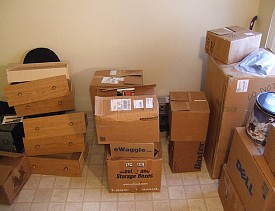So You Got Evicted. What’s Next?
 Eviction can occur for many reasons besides non-payment of rent. You may be evicted because you caused unreasonable damage to the rental; had people living with you who were not on the lease; snuck in a pet where they are not allowed; smoked in a non-smoking apartment; and a variety of other possible reasons. Sometimes, there is no fault on the part of the tenant -- as in the case of the owner selling the property or needing to have a family member take over the rental.
Eviction can occur for many reasons besides non-payment of rent. You may be evicted because you caused unreasonable damage to the rental; had people living with you who were not on the lease; snuck in a pet where they are not allowed; smoked in a non-smoking apartment; and a variety of other possible reasons. Sometimes, there is no fault on the part of the tenant -- as in the case of the owner selling the property or needing to have a family member take over the rental.
Which state you live in, whether you have children, and what your income is will factor into what you can do now that you have been evicted. Eviction is not a quick process unless you’ve been involved in illegal activities.
Besides writing for Networx, I have been a Housing Placement Specialist for a family homeless shelter for several years. I'll tell you what to do if you get evicted.
If eviction renders you homeless:
Hopefully, you aren’t in a situation that renders you or your family homeless. If that is the case, you will need to research what your state provides homeless families.
Massachusetts and New York are the only states with “right to shelter.” This means that anyone who has children under age 21 and is income-eligible may apply for Emergency Assistance through the state’s Department of Housing and Community Development. You currently need to be able to prove you are a local resident to apply. You might be placed in a motel or in a congregate setting. Other states have private and non-profit organizations and systems to help homeless families.
Far less is generally available to singles that are homeless. Check with the local Salvation Army or churches for assistance.
The eviction process:
Whether you are at fault or not, eviction follows a process that is basically the same nationally. If the landlord follows the letter of the law, you will receive a 30-day eviction notice. You might also receive a 14-day notice.
If you are planning to contest the eviction, you will need to engage a lawyer or legal services. At this point, follow the advice of your lawyer. You may also seek advice and help from your state’s housing discrimination agencies, which are often non-profit organizations.
If you are having a conflict with your landlord and believe you are being unfairly evicted, be sure to place your rental payments in escrow until the case has been brought to housing court and a judge rules on the case. Judges do not look fondly on tenants simply not paying rent.
Your landlord is not allowed to physically remove you or your belongings, or lock you out.
If you decide to comply or the eviction goes through:
First of all, try not to panic. Eviction is not an instant process and the law is primarily on the side of the tenant. No matter what, seek legal advice. You may have up to six months to deal with an eviction.
If you paid your last month’s rent ahead of time, that will give you a little more cash to help with finding a new rental. If you gave a security deposit, your landlord has to return it within 30 days as long as you leave the rental “broom clean.” Call a painting contractor to repair damaged painted walls and a professional cleaning service if you are unable to do this work on your own. If all goes well, you will also have your security deposit to apply to a new rental.
Make sure you have good references, such as an employer, if your landlord is unwilling to give you a good reference.
Whether you are single or have a family, you may decide to “double up” with a friend or family member temporarily – but make sure the new landlord knows and approves or you will be in the same situation again ... and so will your housemates.
If you are low-income, talk to your local housing authorities to see what help they have available. Availability of subsidized housing varies greatly by state.
Otherwise, you have time. Talk to family, friends, legal advocates. Start searching rental ads, and as much as you can, try to calmly plan your next move.
Cris Carl writes for Networx.
Updated December 28, 2017.
Looking for a Pro? Call us (866) 441-6648

Remodeling Average Costs
Remodeling Contractors Experiences

Roof Repair Exactly As Dad Requested At Exactly The Right Price

New Low-Maintenance Landscaping To Update Our Yard



